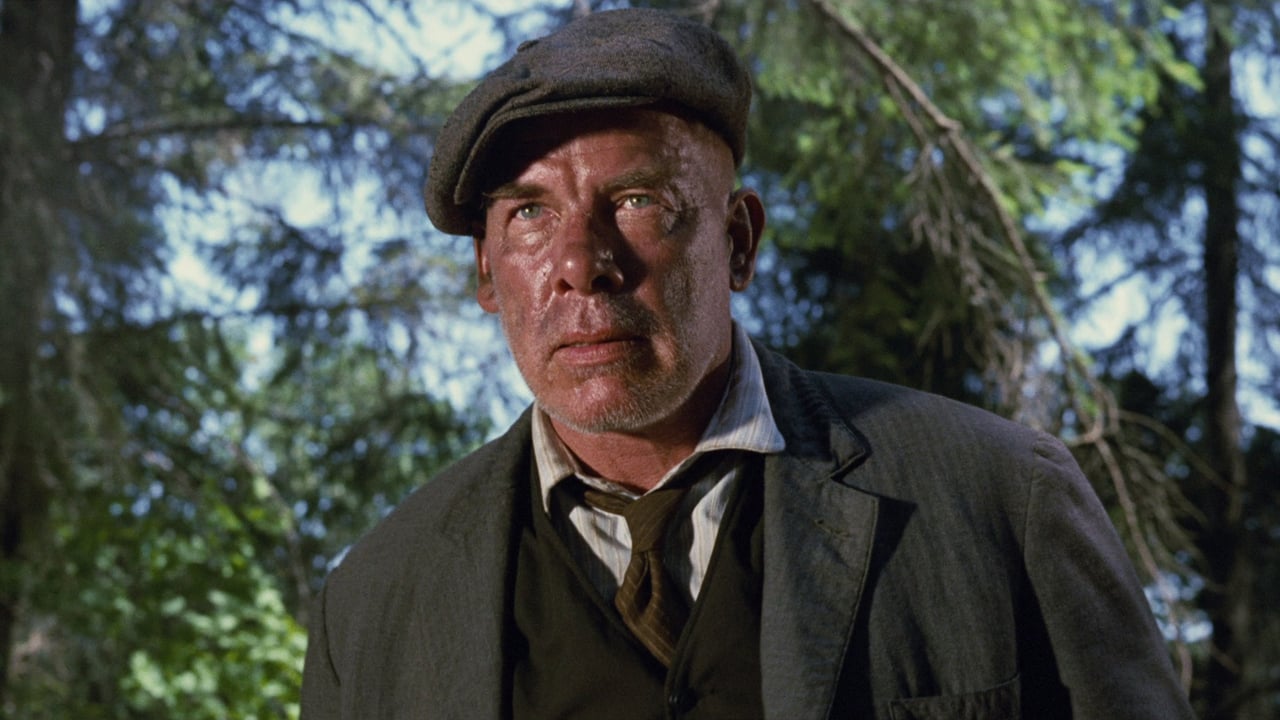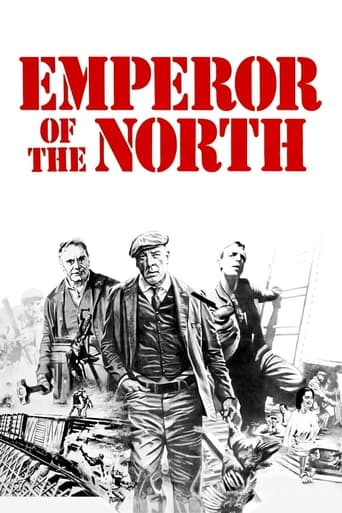Karry
Best movie of this year hands down!
ChikPapa
Very disappointed :(
Teringer
An Exercise In Nonsense
Seraherrera
The movie is wonderful and true, an act of love in all its contradictions and complexity
raymond_chandler
The essence of drama is conflict. Conflict arises from actions or intentions that are at cross purposes. These actions may be classified as 'good' or 'evil' , but these labels depend on the observer identifying with one side or the other. Taoism does not adhere to these classifications; in its pure form, it is amoral.The roles of antagonist and protagonist are similarly dependent on a moral judgment. In "Emperor of the North", Lee Marvin's character A No. 1 is clearly meant to be the protagonist; Ernest Borgnine's Shack is portrayed as the antagonist. Shack is obsessed with keeping (ho)'boes from hitching free rides on his train. A No. 1 takes on the challenge of doing so, in defiance of Shack (and railway regulations). The two men play out their duel on a train that is moving through forests and mountains on its way north to Portland, Oregon. If Marvin is the 'hero', it is a hollow triumph he seeks. There is no promise of a job waiting for him in Portland - he simply wants to 'beat' Shack and remain the widely acknowledged greatest boe there is. His peers are other rootless men who have been driven by circumstance to find work and food wherever they can. Their loyalties are to their empty bellies and, usually, their fellow boes. Some work in the railroad yards for whatever pay they can scrounge. One fascinating aspect of Emperor is the gambling that is shown as widespread: will A No. 1 succeed, or will Shack remain the unconquered, feared, and despised 'champion' of the rails?The time is late October, 1933. There is no welfare state, no food stamp program, no Social Security yet for everyone. These things are a part of Franklin Roosevelt's New Deal, which is in its infancy during this movie. FDR's voice is heard on the radio early on. He urges the citizenry to be scrupulous about the programs he has pushed through Congress; to "cooperate with me, in making this the most efficient, and the cleanest, public enterprise that the world has ever seen". To the men who ride the rails, the prize is their next meal.Marvin is his usual laconic self. He does not attempt to turn A No. 1 into a heroic or noble figure. He is just a guy who is self-assured and fiercely protective of his independence. His underplaying is a thing of wonder. He conveys the decency and humanity of A No. 1 with the slightest of head shaking and almost imperceptible nods and winks.Borgnine is simply awesome as Shack. His sadistic glee at casually maiming and bullying hapless vagabonds is palpable. He keeps his eyes wide open like a giant piranha the whole time. His kind can also be found in other movies, guarding prisons housing felons and herding Jews into the ovens of Auschwitz. Shack gets off on power over others. He is doing his job - maintaining security on the train - but perhaps a little too well. An early incident shows how things can get out of control if the boes are allowed free rein. In a country paralyzed by economic disaster, he protects the interests of the Establishment. If cattle do not arrive at their markets, people, innocent people, may suffer. Again, the morality of the various characters is relative to one's point of view. Is Order Good? Is Chaos Evil? In terms of the physical universe, good and evil are essentially meaningless concepts. A hawk killing a rodent is not evil: it is feeding.Keith Carradine plays Cigaret, a young drifter who follows A No. 1 around, while boasting of his own boe prowess. The relationship between the two reminded me greatly of "The Film Flam Man", where grizzled grifter George C. Scott mentors Army deserter Michael Sarrazin. The dynamic between the two men is much different in "Emperor", but there is an echo of one to be found in the other. The locations and down-home soundtracks of both movies are also similar.The supporting cast is overflowing with familiar character actors. Elisha Cook Jr appears briefly, nearly unrecognizable in an eye patch. Other notables are Malcolm Atterbury as Hogger the engineer, Harry Caesar as Coaly the coal stoker, Charles Tyner as Cracker, the boe assistant to Shack, Matt Clark as railyard boe Yardlet , Liam Dunn as hobo jungle resident Smile, Robert Foulk as a passenger train conductor, and Simon Oakland playing a policeman (again!). The ensemble meshes wonderfully, dutifully providing texture and a backdrop to the central conflict.Robert Aldrich directs the film without gimmicks while creating an immersive experience. The shots of 56-year-old Borgnine and 48-year-old Tyner nimbly running along the top of an obviously real moving train are incredible. As the train continues north, the lush scenery of Northern California and Oregon displays the inherent beauty of indifferent Nature, and provides contrast to the personal drama played out in the foreground. This film is all about survival. If Shack allows boes to ride his train, the company will replace him with someone who will not. And he knows it, which makes him just as desperate as the men he brutalizes. There can be no quarter given in this world, where every loose chicken represents another day of Life. I highly recommend this film. It is not grim, but it is not a comedy, either, although there are numerous humorous moments. It is the stuff that great dramas are made of.
rsubber
"Emperor of the North" is an heroic film. They don't make too many like this one. If you plan to watch it, do yourself a favor: plan to watch it twice. Watch it once so you get the picture: a tramp named A-No. 1 (Marvin) is a devil-may-care legendary figure in the hobo camps. He teaches a thing or three to the inexperienced Cigaret (Carradine). He challenges the thuggish railroad policeman, Shack (Borgnine), there's a supremely brutal fight on a rolling flatcar, the best 'bo wins, he finally rides Shack's "No. 19" to Portland, and, you guessed it, A-No. 1 is the king of the road. Sounds like a few of the "B" movies you've seen over the years? All routinely imaginable stuff, but Marvin's imperial performance stirs the imagination. Watch it again. Watch Mr. Marvin show you everything you ever wanted to know about classic heroism of the spirit. See him surpassing his impoverished circumstances to enjoy a rich life, embracing independence, rugged optimism, casually competent leadership, generous mentoring, and the dauntless strength of a Viking in mortal combat. Finally, A-No. 1 abandons the feckless Cigaret. "You had the juice, kid, but you didn't have the heart!" A-No. 1 rides off, northward, soaring, in high majesty, singing his victory. American hobo. American hero. Emperor of the North.Read more on my blog: Barley Literate by Rick
ShadeGrenade
Having been a supporting actor for years in pictures such as Marlon Brando's 'The Wild One' ( 1953 ), tough guy Lee Marvin unexpectedly acquired leading man status as the '60's drew to a close. His Oscar-winning turn as the drunken cowboy 'Kid Shelleen' in 'Cat Ballou' ( 1965 ) helped, of course, but the role that really turned round his fortunes was that of 'Major Reisman' in Robert Aldrich's 'The Dirty Dozen' ( 1967 ). 'Point Blank!' and 'Paint Your Wagon' ( 1969 ) followed in due course. He was an unlikely star; for one thing, he was not young, and his distinctive deep voice and white hair precluded him from doing too many roles that did not cast him as some grizzled, hard bitten adventurer. In 1973, he was reunited with Aldrich, producer Kenneth Hyman, and actor Ernest Borgnine for this splendid adventure film, scripted by Christopher Knopf. Set in Depression era America, unemployed men - nicknamed 'hobos' by the railroad companies - travel across the country in search of work by stowing away whenever they can on passing trains. The companies fight back by hiring guards to ensure their trains stay hobo-free. One such guard is Shack ( Borgnine ), a sadistic monster who apparently regards the train as his personal property, and any tramp who tries to get on can expect to be either maimed or killed. One poor soul who does this at the start of the film receives a hammer blow to the skull, followed by the removal of his legs as he tumbles onto the track.But a threat to Shack's kingdom appears in the unlikely form of an unnamed drifter ( Marvin ) calling himself 'A No.1'. He decides to take Shack on. Spotting A No.1 climbing into a train compartment, Shack bolts the roof hatch, trapping him. He starts a fire, and when the wooden walls have burnt sufficiently crashes through them to freedom. A younger man, Cigaret ( Keith Carradine ) is impressed. A No.1 becomes a folk hero to other hobos, earning himself the title 'Emperor Of The North Pole', setting the scene for an epic confrontation between the tramp and the railroad man...As was the case with 'Dirty Dozen', the cast is mostly all male ( there are a couple of amusing moments which feature women - Cigaret spies a lady shaving her armpits, and a baptist pushes a woman into a river to cleanse her of sin and when she emerges her white gown has become transparent and her breasts can be seen ), and Marvin dominates the film. Watching the quick thinking A No.1 outwit Shack at every turn is a joy. Imagine a Charlie Chaplin picture with blood and you have 'Emperor Of The North Pole'. The film was criticised on its release for its violence, but I think it was necessary to show the audience what sort of a vile creature Shack was. It makes his final defeat all the more satisfying. Borgnine is terrific, throwing hammers round, a grin on his face, like an insane version of the Marvel Comics' super-hero 'Thor'. Another I.M.D.B. reviewer has made comparisons with John Frankenheimer's 'The Train' ( 1965 ) and I think its a realistic one. In the pre-C.G.I. age, action scenes on moving trains such as the ones seen here had to be done for real, making the film all the more exciting and believable.If you like outdoor adventure films and don't give a fig if the leading man looks old enough to be your grandfather, give this a go. In the U.K., the title was shortened to 'Emperor Of The North' so as not to give the misleading impression it was set in the North Pole.
runamokprods
Interesting, quasi-political film of depression era hobo (Lee Marvin) - famous within hobo circles for being able to ride any train - trying to ride one guarded by meanest guy in the world (Ernest Borgnine). He picks up a young protégé (a very young Keith Carradine) along the way who -- after much resistance - he accepts as the start of the next generation of men who live by their wits and go their own way.The acting is solid throughout. The score is a bit much at times, and some of the writing is variable, but there are good scenes and thoughtful ideas about the battle between 'freedom' and playing by the rules along the way. Aka 'The Emperor of the North'.

